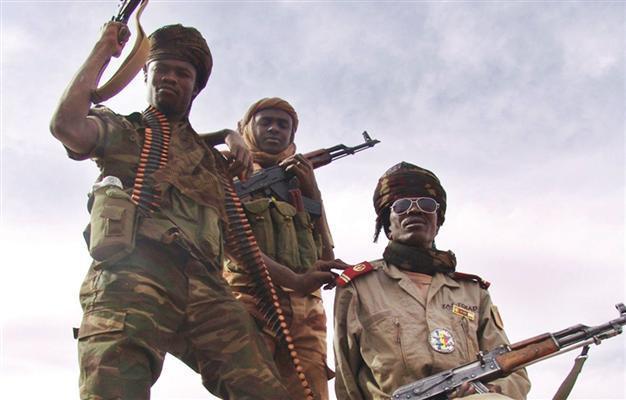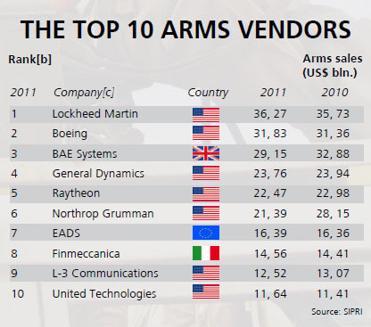Crisis-hit arm vendors see lowest sales since mid-1990s
STOCKHOLM

SIPRI report shows that austerity policies, decreases in military expenditure affect arms sales in North America and Western Europe.
Weapons sales by some of the world’s biggest arms manufacturers have fallen for the first time in 19 years, on the back of a depressed economy and reduced operations in hotspots like Afghanistan and Iraq, a new report has shown.
Sales totaled $410 billion, a 5 percent fall adjusted for currency swings, from $411 billion in 2010, the Stockholm International Peace Research Institute (SIPRI), which carries out independent research on international security, armaments and disarmament, said in its annual review of the industry.
Of the firms monitored by the group in 2011, 74 were based in the United States and Western Europe, generating 90 percent of the sales, roughly unchanged from 2010. The top spots were little changed from 2010 with U.S. firm Lockheed Martin still the biggest, U.S. Boeing overtaking British BAE Systems as number two, and General Dynamics overtaking Northrop Grumman as number four. Turkish company Aselsan ranked 82nd on the list, with a total of $850 million in arms sales – up from 88th place in 2010 with $760 million.
“Austerity policies and proposed and actual decreases in military expenditure as well as postponements in weapons program procurement affected overall arms sales in North America and Western Europe,” it said in a statement. “The draw-downs in Iraq and Afghanistan and the sanctions on arms transfers to Libya also played a role.”

Spending fell for the first time since the mid-1990s, when defense spending had been falling after the end of the Cold War, said Susan Jackson, a researcher at SIPRI.
Sales growth had already slowed in 2010, to 1 percent from 8 percent in 2009, as the withdrawal of foreign troops from Iraq held back demand. While underlining that it was too early to say whether the flattening of military spending represents a long-term change of trend, SIPRI said: “Austerity policies and proposed and actual decreases in military expenditure as well as postponements in weapons program procurement affected overall arms sales in North America and Western Europe.”
But SIPRI said any major new Middle East conflict could change the picture dramatically, both for countries in the region and for the U.S.
The report said cyber security remained a privileged spending area for governments despite budget cuts. “Cyber security has become a top national security issue and there has been a lot of discussion about that over the last years,” SIPRI cyber security expert Vincent Boulanin said. “Countries are willing to gear up to face potential cyber threats from other countries or private actors.”
Cyber security first became a major issue following an attack against Estonia in 2007 that used thousands of infected computers to cripple dozens of government and corporate websites, Boulanin said. Since then, numerous attacks have occurred that have increased the demand for security products, including recent Chinese hacker attacks against The New York Times and The Wall Street Journal.
Boulanin said arms dealers were taking advantage of these developments to expand into new fields and were acquiring smaller companies to grab hold of the necessary technical expertise. The ventures mainly involve services for data and network protection, testing and simulation, training and consulting and operational support.
Top 100 arms-producing and military services companies in the world - 2011 (Excluding China)

 Spending fell for the first time since the mid-1990s, when defense spending had been falling after the end of the Cold War, said Susan Jackson, a researcher at SIPRI.
Spending fell for the first time since the mid-1990s, when defense spending had been falling after the end of the Cold War, said Susan Jackson, a researcher at SIPRI.